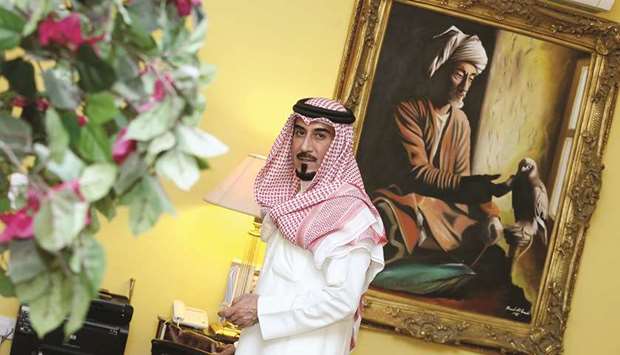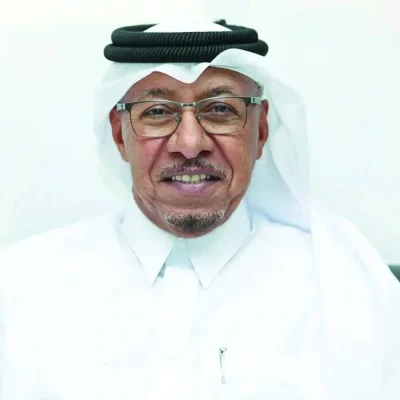A few days ago, Community interviewed him about his life and career as an artist. Sitting with Fouad in his aesthetically designed and well equipped studio in Matar Qadeem spoke volumes about his craft.
Excerpts from the interview:
Please tell us briefly about yourself and your work.
I was born in Kuwait. I graduated from Kuwait University and obtained a degree in Business Administration. My father was a businessman and I started working with him when only 14. After graduation, I started managing one of his companies. I also worked for Kuwait National Bank as I wanted to learn how a bank works.
At the same time, I was pursuing painting as a hobby. I took part in many art related events in the university.
I did not learn painting when I was young. However, when I was in kindergarten, I got a certificate describing me as an “artist”. I was perhaps, different from other children. When they ran after toys, I would go to a stationery shop, looking for painting books, notebooks, and coloured pencils!
We are four brothers and five sisters; I’m 4th in line.
I left Kuwait just before the Gulf crisis in 1990 when my country was invaded. I had my own business and a house at the time, but I told my father I wanted to leave Kuwait because I had a premonition that something bad was going to happen. I went to Saudi Arabia and joined a bank in Jeddah.
After the Iraqi forces occupied Kuwait, I felt very bad. At that time, I moved to Qatar as all my family was already in Qatar. My father also had a good business set-up in Qatar.
How did you manage to pursue painting and master the art?
My work as an artist was at a standstill in the interim. When I was managing my father’s factory in Qatar, I began thinking that I needed to improve my painting. I put in a small advertisement in a newspaper for an art academic teacher in 1994 as I wanted to be a professional as an artist.
My office was in the Industrial Area. I set up my office in the factory as a studio. After my office hours, I would get involved in painting. I would take up a brush and do nothing but paint.
Many teachers responded to my advertisement. I got a call from Ziyad Baquory, an Iraqi art teacher. At the time, he was working at the Youth Creative Center. I joined the Iraqi teacher as a student when there were no members at the Centre. The Youth Creative Center was in its early days.
When he asked me what I wanted to pursue, I told him that I wanted to learn classic and realist paintings. He told me that I had to be patient with him. He said his teaching would be like an army training. I worked with him from 4pm to 9pm every day for an year. Then, I started working on oil painting and reproducing some of the best works in the world. He worked hard with me and enabled me to disprove critics, who felt I would not be able to learn the art.
When I was learning, Qatar National Bank held a competition of artwork on Arab culture. I chose a Pakistani in an Arab dress, who was my friend, as a subject and painted him. However, the organisers rejected my work. This motivated me to prove my worth as an artist.
Continued from Page 5
How do you see your work today?
Today, I see no-one around the world as mature in surrealistic art as I am. I have been sharing my work at exhibitions in different countries. In one of the exhibitions, there were 4,000 paintings but no surrealistic work except mine. The exhibition was held last year. Many artists ask me how I have been doing all this. Some would joke that I have had help from a jinn.
All my surrealistic works tell stories. Everything in a painting is interconnected and tells a story. My paintings are like poems. I like Arabic poetry and tell poems in my paintings. I am also a poet. I translate the meaning on the canvas.
A surrealistic piece of work should be perfect from all sides. In the beginning my surrealistic work was about politics. As a surrealistic artist, one goes beyond reality. It is like painting one’s dream on a canvas.
I am very comfortable when I paint. I am quite satisfied with what I have achieved. I put my imagination on canvas and let people interpret it. I want visitors in an exhibition to stop in front of my paintings for five minutes. I respect visitors and want them to respect my work as well.
How do you see young artists nowadays?
There is a big problem in Arab countries (with artists). They are duplicating Europeans. An artist should make something new. If you are duplicating work of others, you are not an artist. I am also against abstract art. People who do not know art, start creating abstract work.
My work is not for this time; my work is for all times. After ages, when people will look at my work, they will feel something about themselves in it.
What is your next goal?
Actually, I do not like to be famous. It can end my personal life. Now, people have started liking my work and I have been taking part in different exhibitions. I want to establish an art curriculum. I want my style to be taught. Mixing realistic and surrealistic is my art. But it is not easy. Many people want me to teach them. But if you do not possess similar imagination, you cannot do it. I translate my imagination on the canvas.
What piece of advice will you give young artists?
Again, I would say, do not duplicate; create something new. If you cannot create something new, please drop the brush and do something else.
As an artist, how do you see Qatar?
Here in this country, I feel peace for myself. I am actually a businessman. My assistants support me in my businesses. I only come to my studio for painting. I love Qatar.
For me, this country is a paradise. It is an oasis for my art. This country has something magical. The government respects all and the application of law is equal for all.



